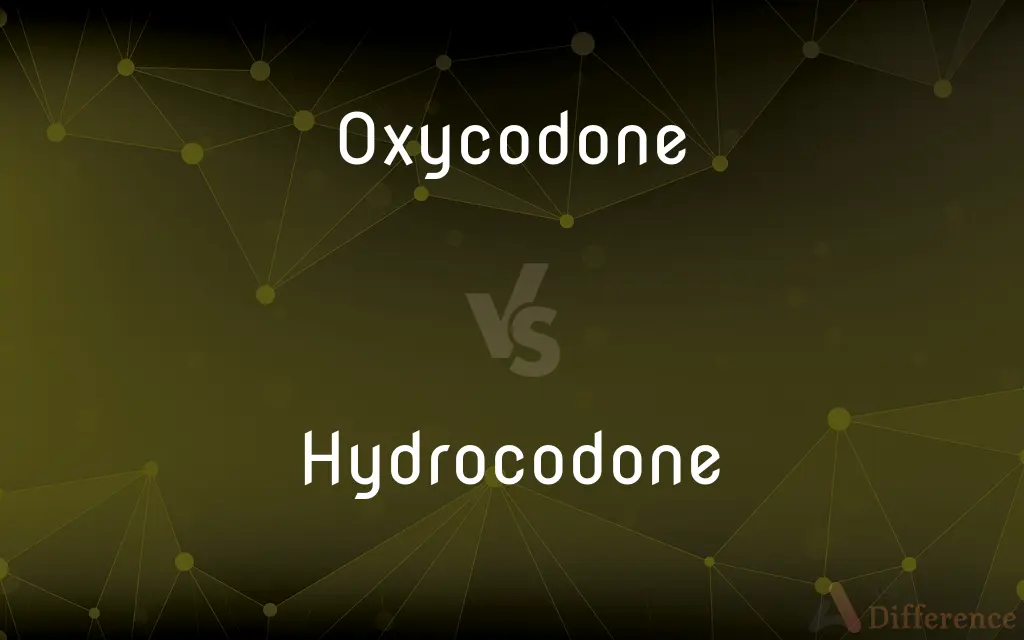Oxycodone vs. Hydrocodone — What's the Difference?
By Fiza Rafique & Urooj Arif — Updated on March 9, 2024
Oxycodone is a potent opioid often used for severe pain management, whereas hydrocodone is slightly less potent and commonly combined with acetaminophen for pain and cough relief.

Difference Between Oxycodone and Hydrocodone
Table of Contents
ADVERTISEMENT
Key Differences
Oxycodone is known for its effectiveness in treating moderate to severe pain, often prescribed after surgery or for chronic conditions. It is available in both immediate and extended-release forms. Hydrocodone, on the other hand, is typically used for milder pain or as a cough suppressant, and is often found in combination medications like Vicodin, which includes acetaminophen.
While oxycodone is generally considered more potent, hydrocodone can also be effective for pain management. However, the presence of acetaminophen in many hydrocodone combinations can pose a risk of liver damage if taken in high doses or over a long period.
Both oxycodone and hydrocodone carry the risk of addiction and dependence, as is common with opioid medications. However, oxycodone's higher potency can sometimes lead to a higher risk of abuse and dependence.
Patients may experience different side effects from these medications. Common side effects of oxycodone include drowsiness, constipation, and nausea, whereas hydrocodone users may also experience similar side effects but with the added risk of liver damage due to acetaminophen.
In terms of prescription, oxycodone is sometimes considered a last resort due to its strength, while hydrocodone, being slightly milder, may be prescribed more frequently for a range of pain severities and as a cough suppressant.
ADVERTISEMENT
Comparison Chart
Potency
Higher
Lower
Common Uses
Severe pain relief
Mild to moderate pain relief, cough suppressant
Combination
Rarely combined with other medications
Often combined with acetaminophen
Risk of Abuse
Higher
Slightly lower
Side Effects
Drowsiness, constipation, nausea
Drowsiness, constipation, nausea, potential liver damage due to acetaminophen
Compare with Definitions
Oxycodone
A narcotic analgesic used to treat moderate to severe pain.
The doctor prescribed oxycodone for her post-surgery pain.
Hydrocodone
An opioid analgesic often combined with acetaminophen.
Hydrocodone/acetaminophen is commonly prescribed for dental pain.
Oxycodone
An opioid medication available in immediate and extended-release forms.
He was switched to extended-release oxycodone for round-the-clock pain management.
Hydrocodone
Used for treating mild to moderate pain and as a cough suppressant.
The doctor recommended hydrocodone for his chronic cough.
Oxycodone
Associated with side effects such as drowsiness and constipation.
She experienced drowsiness after taking oxycodone.
Hydrocodone
Can lead to liver damage if combined with excessive acetaminophen.
Long-term use of hydrocodone combinations can harm the liver.
Oxycodone
Not typically combined with other medications.
Unlike hydrocodone, oxycodone is usually prescribed on its own.
Hydrocodone
Less potent than oxycodone but still carries risks of addiction.
Even though it's less potent, hydrocodone can be addictive.
Oxycodone
Known for its potential for addiction and dependence.
Patients taking oxycodone must be monitored closely due to its addictive nature.
Hydrocodone
Common side effects include nausea and drowsiness.
Hydrocodone made her feel nauseous and tired.
Oxycodone
Oxycodone, sold under the brand names Roxicodone and OxyContin (which is the extended release form) among others, is an opioid medication used for treatment of moderate to severe pain. It is highly addictive and is commonly used recreationally by people who have an opioid use disorder.
Hydrocodone
Hydrocodone, sold under the brand name Zohydro ER, among others, is an opioid used to treat severe pain of a prolonged duration, if other measures are not sufficient. It is also used as a cough suppressant in adults.
Oxycodone
A semisynthetic opioid drug, C18H21NO4, used in its hydrochloride form as a pain reliever, often in combination with nonopioid analgesics such as acetaminophen.
Hydrocodone
A narcotic drug derived from codeine, C18H21NO3, used in its bitartrate form as an analgesic and antitussive.
Oxycodone
(pharmaceutical drug) A synthetic analgesic drug (trademark OxyContin) that is similar to morphine in its effects.
Hydrocodone
(pharmaceutical drug) A habit-forming compound that is derived from codeine and is administered in the form of its bitartrate C18H21NO3·C4H6O6 usually in combination with other drugs (as acetaminophen) as an analgesic or antitussive.
Common Curiosities
How do oxycodone and hydrocodone differ in potency?
Oxycodone is generally considered more potent than hydrocodone.
What is hydrocodone?
Hydrocodone is an opioid analgesic, often combined with acetaminophen, used for mild to moderate pain and as a cough suppressant.
Can hydrocodone cause liver damage?
Yes, the acetaminophen in many hydrocodone combinations can cause liver damage if taken in high doses.
Is oxycodone used for cough suppression?
No, oxycodone is primarily used for pain relief, not as a cough suppressant.
What should you do if you experience side effects from these medications?
Contact your healthcare provider for advice on managing side effects or adjusting your medication.
Are oxycodone and hydrocodone addictive?
Yes, both medications carry the risk of addiction and dependence due to their opioid nature.
Is a prescription required for oxycodone and hydrocodone?
Yes, both medications are controlled substances and require a prescription.
Can you become tolerant to oxycodone or hydrocodone?
Yes, tolerance to both medications can develop over time, necessitating higher doses for the same effect.
What are common side effects of oxycodone?
Drowsiness, constipation, and nausea are common side effects.
What are common side effects of hydrocodone?
Similar to oxycodone, but also includes the risk of liver damage due to acetaminophen.
What should be monitored when taking these medications?
Patients should be monitored for signs of addiction, side effects, and liver health when taking hydrocodone with acetaminophen.
How long can you safely take hydrocodone?
The duration should be as short as possible and under close medical supervision to minimize the risk of addiction and liver damage.
What alternatives are available for pain management?
Non-opioid pain relievers, physical therapy, acupuncture, and other pain management techniques may be alternatives or complements to these medications.
Can these medications be taken together?
It's uncommon and potentially dangerous to take both medications together without a doctor's supervision due to the risk of increased side effects and addiction.
Share Your Discovery

Previous Comparison
Elf vs. Elk
Next Comparison
Loris vs. LemurAuthor Spotlight
Written by
Fiza RafiqueFiza Rafique is a skilled content writer at AskDifference.com, where she meticulously refines and enhances written pieces. Drawing from her vast editorial expertise, Fiza ensures clarity, accuracy, and precision in every article. Passionate about language, she continually seeks to elevate the quality of content for readers worldwide.
Co-written by
Urooj ArifUrooj is a skilled content writer at Ask Difference, known for her exceptional ability to simplify complex topics into engaging and informative content. With a passion for research and a flair for clear, concise writing, she consistently delivers articles that resonate with our diverse audience.
















































